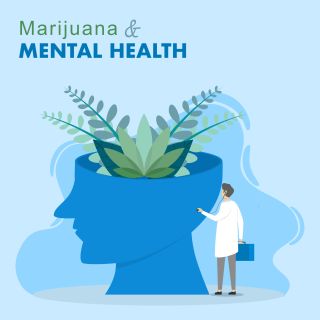Anxiety
What You Need to Know About Marijuana and Mental Health
Legal or not, marijuana doesn't mix well with mental health conditions or drugs.
Posted August 17, 2023 Reviewed by Kaja Perina
Key points
- Marijuana can worsen many other mental health conditions, including ADHD, anxiety, depression and bipolar.
- Your doctor's priority is sustained relief for depression, anxiety, PTSD, or other mental illness.
- Self-medication is dangerous and often complicates mental health treatment.
- Improving your brain health is the best thing for your mood.

By Stephen Manlove, MD
For many individuals, the legalization of recreational marijuana in nearly half of US states is a positive development. However, given the nationwide mental health epidemic, there are well-documented and important facts that you should consider before driving to your nearest dispensary. And this is especially important for those suffering from treatment-resistant depression, anxiety and other conditions where traditional medications have failed.
In fact, a 2018 study found medical marijuana laws, now present in many states, may lead people to treat their own mental health with the drug, stating “Self-medication with drugs or alcohol is commonly reported among adults with mood or anxiety disorders, and increases the risk of developing substance use disorders.”1
How Marijuana Affects Mental Health
Marijuana often helps people relax and relieve stress, so it must be good for people with anxiety, right? Unfortunately, the answer is no. While it is true that the drug can induce an immediate reduction in anxiety, once the immediate effects wear off, people typically experience an increase in anxiety. In fact, regular marijuana use may slowly ramp up anxiety between each use.
Marijuana is a depressant and is known to worsen depression. At Advanced Brain and Body Clinic, we have seen depression decrease and motivation increase for many patients when they stopped using marijuana. Marijuana also worsens many other mental health conditions such as ADHD, bipolar disorder and any psychotic disorder, including schizophrenia.2
Don't Mix Marijuana and Stimulants
Using marijuana simultaneously with stimulants can be dangerous. When marijuana is used in combination with stimulants, the effects can offset each other out and lead to an increased need for both drugs to have the same effect. This can become a dangerous cycle, as marijuana can be mildly addictive. By taking higher doses, you may be at greater risk of developing an addiction.
According to a 2014 exploratory study, Marijuana can have an adverse effect on your heart when combined with ADHD drugs, such as Ritalin (methylphenidate):
“These data raise the possibility that the combination of prescription stimulants, such as methylphenidate, and THC, especially in smoked form, may be a desirable “cocktail” for young adults seeking [euphoria] effects of marijuana without adversely impacting cognitive performance. However, this combination may come at the cost of increasing cardiovascular strain, which could increase risk.”3
Multiple addiction recovery organizations warn that dangerous heart issues can also occur by combining marijuana with another ADHD drug, Adderall. While a ‘weederall’ concoction may seem to help an individual feel simultaneously high and focused, there's greater potential for overdosing on Adderall because the marijuana can numb down some of the stimulant's effects.
Use Caution
Everyone who uses marijuana should do so with caution, as it can have unpredictable consequences, including worsening anxiety, panic attacks, and paranoia. Effects may vary greatly from person to person and between use. Studies show that marijuana is linked to a number of mental health disorders including depression, anxiety, and psychosis (SAMHSA).
Special Considerations for Marijuana Users and Parents
If you are currently taking stimulants or have been diagnosed with psychosis, you should refrain from marijuana use altogether. If you have another mental health disorder, it is also best to avoid marijuana use. If you do choose to partake, keep consumption to occasional use only because regular use is likely to worsen your mental health condition(s).
Parents and those under the age of 18 should be aware that in addition to a heightened potential for addiction, marijuana can have serious long-term effects on the teenage brain. Since the brain does not finish developing until approximately the age of 25, marijuana use can affect normal brain development if used at a younger age. Early marijuana use can lead to permanent problems with memory, learning, and judgment in adolescents.4
If you or someone you know is struggling with addiction, reach out to your primary care provider or a substance abuse specialist as soon as possible. Also, your state’s Health and Human Services department should have links to local and national resources for drug and alcohol addiction, similar to this one for Minnesota.
Your Doctor’s Role
If you are looking for sustained relief for depression, anxiety, PTSD, or other mental illness, your mental health provider will likely recommend stopping marijuana usage. Just make sure you inform your primary doctor and psychiatrist so they can make the best decision with you. Self-medicating with other substances can make it difficult for your medical team to determine whether medications are working.
Our clinic’s standard is not to mix marijuana and certain medicines, particularly with advanced treatments like ketamine. An important part of what we do is manage medications for patients, which means choosing the best combinations for patient wellness. This includes removing potential triggers and managing medications to ensure that you have an optimal combination that will provide the maximum benefit with the least amount of medications necessary.
Covering up symptoms with medications or drugs will only result in a need to increase the amount of medication you are taking over time to have the same therapeutic effect. That’s why our goal is to get to the root of your psychiatric condition by incorporating holistic practices such as lifestyle modifications and vitamin/mineral supplements to ensure that your brain functions optimally.
References
Sarvet AL, Wall MM, Keyes KM, Olfson M, Cerdá M, Hasin DS. Self-medication of mood and anxiety disorders with marijuana: Higher in states with medical marijuana laws. Drug Alcohol Depend. 2018 May 1;186:10-15. doi: 10.1016/j.drugalcdep.2018.01.009. Epub 2018 Mar 2. PMID: 29525698; PMCID: PMC5911228.
MN Department of Health. Important Information and Warnings About Using Medical Cannabis. https://www.health.state.mn.us/people/marijuana/docs/patients/patientinfosheet.pdf
Kollins SH, Schoenfelder EN, English JS, Holdaway A, Van Voorhees E, O'Brien BR, Dew R, Chrisman AK. An exploratory study of the combined effects of orally administered methylphenidate and delta-9-tetrahydrocannabinol (THC) on cardiovascular function, subjective effects, and performance in healthy adults. J Subst Abuse Treat. 2015 Jan;48(1):96-103. doi: 10.1016/j.jsat.2014.07.014. Epub 2014 Aug 7. PMID: 25175495; PMCID: PMC4250392. https://www.ncbi.nlm.nih.gov/pmc/articles/PMC4250392/
Volkow ND, Swanson JM, Evins AE, et al. Effects of Cannabis Use on Human Behavior, Including Cognition, Motivation, and Psychosis: A Review. JAMA Psychiatry. 2016;73(3):292–297. doi:10.1001/jamapsychiatry.2015.3278 https://discovery.ucl.ac.uk/id/eprint/1481951/1/Curran_Volkow%20et%20al%202016.pdf




